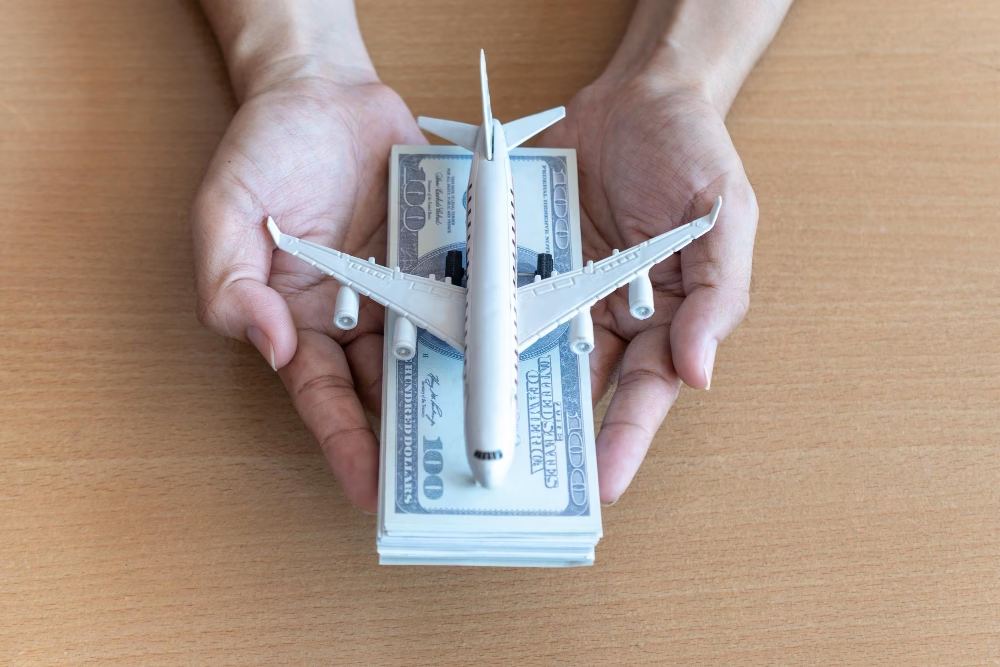
This post may contain affiliate links that at no additional cost to you, we may earn a small commission. Read the Disclosure Policy for more information.
Last Updated on September 2, 2025 by Katie
Dreaming of seeing the world without draining your savings? If you’re a digital nomad or planning a long-term adventure, you can discover how to travel the world on a budget with some smart planning and a few simple strategies.
In this guide, you’ll get 25 practical tips designed to help you save at every stage of your journey, from booking flights to daily spending.
These budget travel tips are tailored for anyone who wants more freedom without overspending, whether you’re hopping between countries or settling in for a few months.
Get ready to simplify your planning and keep your costs low so you can focus on the experiences that matter.
If you’re new to life on the road, you might also find these first-time nomad survival tips helpful as you begin your travels.
Want to Make Money On Your Travels?
* Get Paid to do Voiceovers from Your Laptop – FREE Mini-course Intro to Voiceovers.
* Work Anywhere as a Freelance Transcriptionist – Learn Transcription Skills with Transcribe Anywhere and Open Doors to New Remote Jobs.
* Start Your Own Thriving Proofreading Business – Learn how to get started in this FREE proofreading workshop.
* How to Start a Bookkeeping Business from Home – Free training series from the team at Bookkeepers.com.
Planning and Saving Before You Go

Smart travellers know that their budget begins long before they set foot in another country.
The first phase in learning how to travel the world on a budget is all about preparation: setting clear goals, tracking your progress, and taking simple steps to stretch your money further.
Small, early moves can add up to hundreds (or even thousands) in savings once you hit the road.
1. Set a Travel Savings Goal
Figure out exactly how much you’ll need for your trip.
Break your target into categories such as flights, accommodation, food, activities, and an emergency fund.
Look at your itinerary and research estimated daily costs for each destination. Once you’ve got a number, open a dedicated savings account.
Automate regular deposits each month so you always know how close you are to reaching your goal.
Keeping travel funds separate makes it easier to avoid dipping into them for everyday expenses.
- Tip: Some banks let you nickname your account “World Trip” or “Gap Year,” which helps keep you motivated.
2. Track Expenses with Budget Apps
Keeping tabs on every dollar helps you avoid overspending before and during your travels.
Install free budgeting and expense-tracking apps that automatically categorise your spending.
These apps can also help you stick to a daily or weekly budget by showing visual reminders when you’re close to your limits.
Digital nomads and long-term travellers benefit most from tools that also convert currencies on the go. C
Check out the best apps for digital nomads for up-to-date expense tracking, real-time exchange rates, and simple ways to split costs with fellow travellers.
3. Choose Low‑Cost Destinations
Your money goes much further in some places than others.
Southeast Asia, parts of Central America, and Eastern Europe are famous for low daily expenses.
Picking these destinations allows you to extend your travels without sacrificing comfort or missing out on activities.
Here’s a simple cost comparison to illustrate how daily expenses can differ widely:
| Destination | Avg. Daily Cost (USD) |
|---|---|
| Thailand | $35 |
| Vietnam | $30 |
| Portugal | $55 |
| Poland | $40 |
| Australia | $100 |
If you want to dig deeper into what flexible travel budgets can accomplish, read this overview of what it costs to travel the world for a year.
4. Travel in Off‑Season
Travelling when demand is low saves you big on both flights and hotels.
Look for shoulder or off-seasons, which fall just before or after peak tourist times.
Prices can drop by as much as 50 per cent, and local businesses often run discounts to attract the smaller crowds.
You’ll also enjoy shorter lines, more personal service, and quieter attractions, all of which add to a more relaxed experience.
5. Book Flights Early and Use Alerts
Lock in your flights well in advance, especially for popular routes.
Use flight search engines and set up price alerts on your preferred travel dates. As soon as a fare drops, book it quickly before prices rise again.
Early bookings not only guarantee lower prices, but they also give you more choice in schedules and seats.
This is one of the most direct ways to start saving before your trip even begins.
6. Use Credit Cards with No Foreign Fees
International transaction fees add up fast if you’re not careful.
Select a travel-friendly credit card that charges zero foreign transaction fees and features perks like travel points or cash back.
Many banks offer cards designed for international travellers—just call and ask before applying.
Using the right card also gives you extra protection and potential rewards with every purchase you make abroad.
7. Create a Daily Budget Spreadsheet
Before you leave, start tracking your planned expenses in a simple spreadsheet.
Divide it into key categories such as food, transportation, accommodation, and extras. Set a maximum for each, then review your progress weekly so you can spot patterns and hold yourself accountable.
This method helps prevent surprise shortages and lets you adjust quickly, ensuring your savings last for the duration of your trip.
To sharpen your saving skills before leaving, you can read about how to save money on a low income, packed with practical ideas to stretch any budget, no matter your starting point.
Cutting Costs on Transportation

Transportation is often one of the biggest expenses when looking at how to travel the world on a budget.
Making smart choices about how you move between cities and countries means you can spend more on experiences and less on simply getting from place to place.
With a little research and flexibility, you’ll find it’s possible to cut your travel costs by hundreds, even thousands, over the course of a longer trip.
8. Fly Budget Airlines and Use Point Hacks
Low-cost airlines make international travel much more accessible if you know where to look and how to book.
Major budget carriers operate on nearly every continent. Compare these carriers on aggregator sites, sign up for their email lists, and check deal platforms for flash sales.
Use fare alerts from websites or apps like Skyscanner or Google Flights to get notifications about the lowest prices.
Don’t forget to maximise your travel reward points and miles. Before you fly, dig into your credit card rewards and airline loyalty programs.
Booking one-way flights or using a mix of miles and cash can sometimes unlock the best deals.
9. Travel Overnight by Bus or Train
Night buses and trains remain popular among savvy travellers, especially in Asia and Europe, where you can cover a lot of ground while you sleep.
Not only do these options typically cost much less than flights, but they also double as your accommodation for the night.
Sleeper buses with reclining seats or full beds run throughout Vietnam, Thailand, India, Turkey, and a growing number of European countries.
The social side is another major plus – you’ll often meet other digital nomads and travellers along the way.
If you plan to travel long distances, research popular overnight routes or consider train passes, which provide extra flexibility at a bulk discount.
Saving on a night’s lodging while moving to your next destination is budget travel efficiency at its best.
10. Use Public Transit and Walk
In most parts of the world, public transportation is not only affordable but also efficient.
Whether you’re hopping on city buses, suburban trains, or local trams, you’ll cut costs compared to rideshares or taxis.
Cities from Berlin to Bangkok are built for people who use transit daily, and routes are usually easy to learn once you arrive.
Walking is free and also one of the best ways to find under-the-radar shops, local markets, and unexpected sights.
If you need to go farther, try local apps or maps to combine different modes of public transit.
11. Avoid Checked‑Baggage Fees
Budget airlines lure you in with low fares, but then charge steep fees for checked bags.
Skip these hidden costs by travelling with just a carry-on. Invest in lightweight, compact luggage and use compression packing cubes to maximise space.
Check airline rules carefully to make sure your bag’s size fits within the free allowance.
Packing less makes it easier to move quickly and switch transport methods when needed.
You’ll breeze through airports, save time, and avoid any surprises at the check-in counter. Less to carry means less to worry about throughout your journey.
12. Be Flexible with Your Travel Dates
Flight prices often change depending on the day of the week or season.
If you can, stay flexible about your departure and arrival dates. Use the “flexible dates” function on flight search engines to see cheaper options a few days before or after your ideal itinerary.
Tuesdays and Wednesdays are usually the least expensive for flights, especially for international travel.
The more you widen your date range, the more opportunities you have to snag a bargain.
Avoiding school holidays and peak tourist seasons will almost always yield better prices on both flights and other transport.
13. Research Local Transportation Passes
Before you touch down in a new city, look up whether they offer daily, weekly, or monthly transit passes.
These can dramatically lower your costs if you’ll be using the metro, buses, or trams more than a few times.
In cities like Paris, London, Tokyo, and Bangkok, unlimited-ride passes pay for themselves quickly.
Many destinations also provide travel cards for visitors that include attractions or discounts on top of transportation.
This not only saves money but reduces the hassle of buying single tickets each time. Plan ahead to take advantage of deals made for travellers who want to see more of the city for less.
Cutting costs on transportation matters when learning how to travel the world on a budget. Each choice adds up, leaving more in your pocket for food, adventures, or your next place to stay.
Affordable Accommodation Strategies

Finding affordable accommodation is key if you want to know how to travel the world on a budget.
A place to rest your head doesn’t have to be expensive to be safe, comfortable, or social.
Exploring a mix of budget-friendly lodging options can stretch your funds further, freeing up cash for experiences, food, and local adventures.
14. Stay in Hostels or Dorm Rooms
Hostels and dorm rooms are the go-to choice for budget travellers looking to keep nightly costs low.
These spaces often cost a fraction of a hotel room while providing a friendly, social environment where you can meet travellers from around the world.
Many hostels offer not just beds, but shared kitchens, lounge areas, fast Wi-Fi, and often free walking tours or city maps.
Having a kitchen can make a massive difference, letting you cook some meals instead of eating out every day.
Many digital nomads find that the blend of affordability and community helps keep travel rewarding, especially for solo travellers.
Websites and apps make it easier to compare hostel reviews and prices so you can prioritise clean, safe spaces with good facilities.
Check out these trusted hostel sites for cheap rooms:
15. Leverage Long‑Term Airbnb Discounts
Booking longer stays on Airbnb can lead to major discounts, with many hosts offering 10 to 20 percent off for weekly or monthly bookings.
Extended stays usually come with perks like faster Wi-Fi, kitchen use, and local insider tips from hosts. You may also find quieter spaces with more privacy compared to shared hostels.
If you plan on staying several weeks in one place, message the host before booking to ask about additional discounts or special offers.
Hosts are often willing to negotiate, especially in the low season or if a property is empty for a stretch.
Consider this a smart way to keep your costs predictable while enjoying the comfort of a homelike setting.
16. Try House‑Sitting or Couch‑Surfing
House-sitting lets you stay for free in exchange for simple tasks, like watering plants or taking care of pets.
Popular platforms like Trusted House Sitters and Couch Surfing connect you with homeowners looking for trustworthy guests.
Couch-surfing is another zero-cost option, allowing travellers to stay with locals for a few nights. You’ll often get insider knowledge about the city and a built-in friend, all without a hotel bill.
Safety and trust are priorities, so always read reviews and stick to well-known sites.
The social experience can be as valuable as the savings, helping you connect with people and cultures in authentic ways.
These options work especially well for slow travellers who want to dig into local life for a bit longer.
17. Negotiate Directly with Guesthouses
Many smaller guesthouses or family-run inns are open to negotiation, especially if you plan to stay for a week or more.
Don’t rely only on booking platforms with fixed prices. Instead, call or email the property directly to discuss your travel dates and ask about possible discounts for longer stays or off-peak periods.
Owners often appreciate avoiding third-party booking fees, so they might pass some of the savings to you.
This approach can unlock lower nightly rates, free upgrades, or breakfast included at no extra charge.
If you’re flexible in your plans, you’ll find that a polite, direct approach can be one of your best money-saving strategies.
18. Use Work‑Exchange Platforms
Platforms connecting travellers with volunteer opportunities are a great way to keep your accommodation budget low.
In exchange for a few hours each day helping out—whether that’s cleaning, reception work, gardening, or teaching English—you get a free place to stay.
Popular work-exchange programs include help at hostels, organic farms, or non-profits.
One example is WWOOF, where you can live and learn on organic farms.
The work is usually light and gives you plenty of free time to explore. You’ll learn new skills, build your network, and get an inside look at a new place—all for much less than the price of a hotel.
Just remember to check reviews and agreements in advance for clarity about work expectations and amenities.
19. Choose Budget‑Friendly Regions
Lodging costs drop fast outside major tourist areas or city centres.
Search for accommodation in residential neighbourhoods or suburbs with direct access to transit lines.
You’ll get a more local experience and save money each night. This tip is especially useful if you’re in countries known for affordable living standards.
Look into destinations in Southeast Asia or Eastern Europe, where quality hostels, apartments, and guesthouses cost far less than the global average.
Countries listed in Asia digital nomad visa destinations and Europe digital nomad visa options regularly attract long-term travellers for this reason.
Choose neighbourhoods known for safety and good transport connections, so you never sacrifice convenience for savings.
Pulling together these approaches transforms how to travel the world on a budget into a series of smart, easy choices—so more of your money goes where it matters most.
Food, Money & Free Activities

Mastering how to travel the world on a budget comes down to controlling your daily expenses, especially on food, cash management, and the priceless experiences you can enjoy without spending anything.
These strategies keep your wallet happy and make your travels more authentic, sustainable, and fun.
20. Cook Your Own Meals Where Possible
Another top way how to travel the world on a budget is to buy groceries from local markets and cook for yourself.
Fresh produce, breads, and cheeses often cost a fraction of restaurant meals, especially if you visit markets late in the day when vendors may discount unsold items.
Most hostels, Airbnbs, and guesthouses provide kitchens or at least basic facilities. Take advantage of them.
Not only does cooking your own meals slice your daily expenses, but it also lets you sample local ingredients and traditional recipes in a relaxed setting.
This approach is both healthy and budget-friendly.
Quick tips for success:
- Shop at open-air markets and small groceries instead of supermarkets.
- Prepare picnic lunches for sightseeing days.
- Cook simple, hearty dishes like stir-fries, sandwiches, and pasta.
21. Eat Street Food and Local Eateries
Street food is often where you’ll find the boldest flavours and the most local atmosphere.
Dishes at street stalls or humble cafés usually cost a third of what you’d pay at formal restaurants. You’re supporting small business owners and getting a true taste of the culture.
Look for spots busy with locals, as high turnover means fresher food and better hygiene. Try specialities from vendors with a line (always a good sign).
Sampling street eats is a great way to stretch your budget while building memories around food.
22. Carry a Reusable Water Bottle
Small costs pile up quickly. Buying bottled water every day not only increases expenses but also adds to plastic waste.
Most major cities now have public water fountains, and many airports and hostels provide refill stations.
By keeping a sturdy reusable water bottle with you, you stay hydrated for free, cut single-use plastic, and save a surprising amount of money over months on the road.
Some countries even have apps or maps to help you find refill points.
Tip: In regions where tap water isn’t safe, use a bottle with a built-in filter, or look for filtered water stations in supermarkets and transit hubs.
23. Use No‑Fee Cards and ATM Strategies
International ATM and card fees can chip away at your travel funds if you’re not paying attention.
Always bring at least one debit card that doesn’t charge foreign transaction fees. Some banks refund ATM charges or have global partner networks that lower costs.
Take out the maximum amount allowed per transaction to decrease the number of expensive withdrawal fees.
Keep smaller bills on hand for markets and local buses.
For a deeper dive into these tactics, see these tips to save money on a low income, so you’re always prepared to stretch your cash further.
24. Track Spending with Apps
Managing your daily expenses on the road is much easier with a budgeting app on your phone.
These tools help you track spending, set limits, and spot wasteful habits before they drain your savings.
Apps that allow currency conversion and categorising expenses by type simplify the process even more.
Key features to look for:
- Real-time expense tracking
- Automatic categorization (food, transport, accommodation)
- Alerts when nearing daily or weekly spend limits
25. Enjoy Free Walking Tours and Museum Days
Cities across the world offer free or “pay-what-you-wish” walking tours guided by locals.
These tours introduce you to neighbourhoods, local history, and hidden gems in a friendly, group setting. You pay only what you think the experience is worth, and tipping is common practice.
Many museums also offer regular free admission days or evenings.
This is your chance to enjoy art and culture without a price tag. Local tourism boards and travel forums often maintain updated lists of these opportunities.
With these food, money, and free activity strategies, you’ll have more cash left for the experiences that matter while staying true to your goal of learning how to travel the world on a budget.
Final Thoughts on How to Travel the World on a Budget
Learning how to travel the world on a budget comes down to making steady, mindful choices.
These 25 tips show you how much you can save by preparing early, choosing affordable options, and looking for the free or low-cost resources available to travellers.
Small changes—like using budget transportation, seeking local food, and tracking expenses—build a foundation for longer, richer journeys.
Pick a few strategies from this guide and start today. Each dollar you save opens the door to new experiences and extra time on the road.
Careful planning and smart spending help you get the most from every trip.
For more ways to keep your spending in check, consider reviewing a budget-friendly list of items to cut from your shopping routine at home or while abroad.
Every step you take now gets you closer to your next destination.
Thank you for reading and investing in your travel dreams.
If you have favourite money-saving travel habits or want to share your journey, leave a comment below. Your insight might help someone else see more of the world for less.
remoteworkrebels.com (Article Sourced Website)
#Travel #World #Budget #Tips #Save #Big
